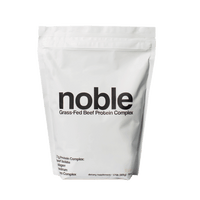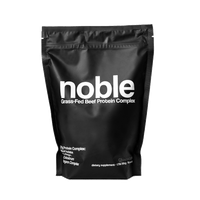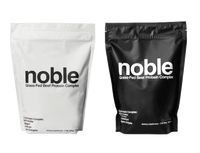
Why Does Your Liver Need a Detox? (Signs & Tips)
Share
Are you dozing off at work and fighting to keep your eyes open? Do you often overindulge in unhealthy foods and alcohol?
If so, your liver may be begging for a detox!
Fact: The liver is your body's natural filter, removing toxins and waste products.
This article will help you determine if your liver needs a detox and how it could benefit your health.
Get ready to discover the secrets of a happier, healthier liver!
Key Takeaways
- The liver filters toxins and waste products from the body, making optimal liver functioning essential for your health.
- A liver detox can promote weight loss by improving the efficiency of fat metabolism and reducing inflammation caused by toxin overload.
- Detoxifying the liver can boost energy levels by supporting the conversion of dietary fiber and carbohydrates into fuel for the body.
- Because of how closely connected the liver and gallbladder are, regular detoxification of the liver can aid in preventing the formation of painful and potentially dangerous gallstones.
- Signs that your liver may need a detox include fatty floating stools, constant fatigue, new allergies or sensitivities, and overexposure to toxins.
Understanding the Role of the Liver
Think of your liver as a football team’s star quarterback. Just as a quarterback orchestrates plays, reads the field, and makes split-second decisions, the liver manages the body's metabolic game plan.
The primary task?
Acting as the body's filtration system.
Your liver is busy converting toxins into waste products, cleansing the blood, and metabolizing nutrients and medicines daily, with no time off.
Our MVP player flawlessly handles nutrient metabolism and waste elimination.
From breaking down fats to converting glucose into glycogen (the body's stored energy), every function it performs aids our bodies' overall well-being.
Yet this superstar isn't immune to damage (even the best players are susceptible to injury!)—overindulgence in food or alcohol can negatively affect its performance.
Detoxifying your liver isn't about quick fixes or trendy cleanses. Instead, it's rooted in embracing wholesome habits.
Prioritize nutrient-dense foods and beneficial fats that bolster liver health. Steering clear of elements that inflame or harm this vital organ is equally crucial.
Truly, liver care is a journey of consistent, informed choices, not fleeting trends.
Johns Hopkins hepatologists recommend keeping healthy habits for optimal liver functioning rather than relying on trendy cleanses.
Why Does Your Liver Need a Detox?
Your liver needs a detox to promote weight loss, boost energy levels, combat aging, prevent liver stones, and detoxify the rest of your body.

Your liver’s role in weight loss
Striving for a healthier liver can result in weight loss. The liver aids in metabolizing fats and sugars from foods we eat and is one of your body's primary fat-burning organs.
An unhealthy or overworked liver is sluggish at this essential task due to toxin overload.
This inefficiency can turn excess sugar into stored fat, pushing up those numbers on the scale. (1)
On the other hand, a well-functioning, detoxed liver rapidly burns fat with ease while filtering toxins from unhealthy fats and excessive sugar consumption.
A healthy diet that supports the liver further accelerates weight reduction by taming inflammation and expelling unwanted accumulated waste products.
Boosted energy levels
Your liver plays a pivotal role in converting dietary fiber and carbohydrates into fuel for your body.
An overworked or inefficient liver can inhibit energy production, leaving you tired and drained.
Your liver combats aging
Keeping your liver healthy and detoxified can also be a nifty weapon against aging.
By turning toxins into waste and efficiently banishing them from your system, this busy organ helps limit the damage these harmful substances can do to your cells over time.
The less toxin-induced wear and tear, the slower you'll age!
Prevention of gallstones
Gallstones are hardened deposits in the liver's bile ducts and gallbladder.
These stones can lead to blockages within the liver and related organs and cause various health issues.
Detoxification of the body
Your liver is a filter, removing toxins and waste products from your bloodstream.
When your liver isn't functioning optimally, these toxins can build up in your body, leading to various health issues.
By giving your liver a much-needed cleanse, you're helping it efficiently eliminate these toxic agents and improve overall well-being.
It's important to note that while numerous detox products claim to rid your body of toxins, many still need to be thoroughly tested in clinical trials and may even cause harm to the liver.
So be cautious when choosing a detox method and consult a healthcare professional before starting any cleanse or supplement regimen.
Signs Your Liver May Need a Detox
Fatty floating stools, constant fatigue, new allergies and sensitivities, and overexposure to toxins are all signs that your liver may need a detox. Let’s dive deeper.
Please be aware that many of these signs can also be associated with other health conditions outside your liver needing some TLC and should be taken seriously.
Please consult your physician if you are experiencing any of these signs and symptoms listed.
Fatty floating stools
One sign that your liver may need a detox is the presence of fatty floating stools. These stools appear greasy pale, and float on the toilet water.
This happens because the liver plays a crucial role in bile production, which helps with nutrient separation and the breakdown of fats.
When the liver is not functioning correctly, it can lead to an inefficient breakdown of fats and minerals, resulting in excess fat being eliminated through the stool.
Therefore, if you notice this symptom, it may be time to support your liver health through a detoxification process.
Constant fatigue
Are you constantly tired? Your liver may be trying to tell you something. The liver is crucial to our overall health, including regulating energy levels.
When the liver is overloaded with toxins and waste products, it can become less efficient at its job, leading to constant fatigue.
This is because the liver converts glucose into glycogen for energy production and also helps regulate hormones like cortisol (the stress hormone) and melatonin (the sleep hormone).
So, if you're constantly feeling exhausted, it may be a sign that your liver needs some detoxification love.
New allergies and sensitivities
The liver plays a crucial role in filtering blood and removing toxins from the body.
When it becomes overloaded with toxins, these harmful substances can circulate throughout your system, leading to allergic reactions or increased sensitivities.
Giving your liver a much-needed cleanse can help reduce the chances of developing new allergies or sensitivities and promote overall better health.
Remember, it's essential to consult with healthcare professionals before starting any detoxification regimen to ensure safety and effectiveness.
Overexposure to toxins
Toxins are all around us. Your liver is responsible for filtering and removing toxins from your body, but when you're overexposed to harmful substances, it can overload this hardworking organ.
This can lead to a buildup of toxins in the liver and potentially cause liver damage or inflammation.
Be mindful of the toxins you encounter daily, such as air pollution, chemicals in cleaning products or personal care items, and even certain medications.
Reducing exposure to these toxins can help keep your liver functioning at its best.
Top Tips for Liver Detoxification
To promote liver health and detoxify your liver, eat bitter foods and herbs, stay hydrated, avoid aerosols and toxic personal care products, and reduce your consumption of alcoholic beverages.

Consumption of bitter foods & herbs
Bitter foods and herbs can stimulate bile production and aid detoxification. Here are some options to consider:
- Milk thistle: This herb has been used for centuries to promote liver health. It contains a compound called silymarin, which has antioxidant and anti-inflammatory properties.
- Turmeric: Known for its vibrant yellow color and earthy flavor, turmeric contains an active compound called curcumin. Curcumin has been found to protect the liver from toxins and promote liver regeneration.
- Dandelion: Often considered a pesky weed, dandelion leaves can benefit your liver. They help stimulate bile production and improve digestion.
- Chicory: This bitter plant is commonly used as a coffee substitute. It can help increase bile production and support overall liver function.
- Fenugreek seeds: These tiny seeds have a slightly sweet, nutty flavor. They contain substances that aid in preventing toxins from harming the liver.
Hydration for liver detox
The liver plays a crucial role in filtering and removing toxins from your bloodstream, but it needs adequate hydration to do so effectively.
When dehydrated, the liver's ability to expel waste products is hindered.
Drinking enough water helps support good liver function and aids in weight loss by promoting the breakdown of fats and minerals.
It also assists in nutrient separation, toxin elimination, and energy production. (2)
Avoid aerosols and toxic personal care products.
To keep your liver healthy, avoiding aerosols and toxic personal care products is crucial.
Many aerosols and personal care products contain chemicals linked to liver damage.
These chemicals can be absorbed through your skin or inhaled, reaching your bloodstream and liver. These toxins include:
- Parabens: Synthetic preservatives linked to hormone disruption.
- Phthalates: Used in plastics, they're endocrine disruptors affecting development.
- Formaldehyde-Releasing Preservatives: Slowly release formaldehyde, a carcinogen.
- Synthetic Fragrances: Mix of chemicals causing allergies and sensitivities.
- Sodium Lauryl Sulfate (SLS) and Sodium Laureth Sulfate (SLES): Foaming agents causing skin irritation.
- Triclosan: Antibacterial linked to resistance and hormone disruption.
- Coal Tar Dyes: Synthetic colorants potentially carcinogenic.
While these ingredients have raised concerns, not all individuals will react to them, and the degree of risk can depend on individual sensitivity, exposure levels, and frequency of use.
Reading labels, choosing products with simple ingredient lists, and considering products labeled as "fragrance-free" or "hypoallergenic" can help reduce potential exposure to these toxins.
Consulting a dermatologist or healthcare professional can provide personalized guidance if you have specific health concerns or sensitivities.
Reduce your consumption of alcoholic beverages.
While this may sound like a buzz kill (literally), excessive consumption of alcohol is the leading cause of liver disease.
Since the liver is the only way our bodies can metabolize alcohol, excessive consumption can overwhelm its detoxification capacity.
It's important to note that the impact of alcohol on the liver can vary based on factors such as the amount and duration of alcohol consumption, genetics, and individual susceptibility.
The best way to maintain liver health is to limit alcohol consumption to moderate levels or abstain from alcohol altogether.
How to Detox Your Liver (The Natural Way)
Embarking on a Liver-Centric Wellness Journey? Here are some key tips for detoxing this vital organ naturally:
- Eat more fruits and vegetables: These nutrient-packed foods provide antioxidants, vitamins, and minerals that support liver health and aid in detoxification.
- Stay hydrated: Drinking enough water helps flush toxins out of your body and keeps your liver functioning optimally.
- Reduce your alcohol consumption: Since the liver is responsible for processing alcohol, doing so gives your liver a break and enables it to concentrate on detoxifying other substances.
- Eat liver-friendly herbs: Milk thistle and turmeric extract have been traditionally used for liver health, but more clinical trials are needed to confirm their effectiveness.
- Exercise regularly: Physical activity boosts blood circulation, which helps deliver oxygen and nutrients to the liver while effectively removing waste products.
- Reduce stress: High stress levels can contribute to liver damage, so finding healthy ways to manage stress, such as meditation or yoga, can help support your liver's function.
- Limit processed foods and added sugars: These can put extra strain on your liver as it tries to process them, accumulating toxins in the body.
- Get enough sleep: Adequate sleep allows your body to repair itself, including the liver. Lack of sleep can disrupt hormone regulation, including cortisol (stress hormone) and melatonin (sleep hormone), which can impact liver health.
- Avoid exposure to toxins: Avoid chemicals found in cleaning products, personal care items, and environmental pollutants as much as possible to reduce the burden on your liver.
- Eat a balanced diet with healthy fats: Eating foods rich in omega-3 fatty acids, like salmon or chia seeds, can help reduce liver inflammation and promote overall health.
Boost your liver with these natural methods! Pair them with regular workouts, a balanced diet, and minimal alcohol.
Steer clear of habits that harm your liver.

Best supplements for liver detox
To give your liver a much-needed detox, several supplements can help. Here are the best ones:
- Milk Thistle: This herb has been used for centuries to support liver health. It contains a compound called silymarin, which has powerful antioxidant and anti-inflammatory properties.
- Turmeric Extract: Known for its vibrant yellow color, turmeric is a potent antioxidant and anti-inflammatory spice. It can help reduce inflammation in the liver and protect it from damage.
- Dandelion Root: Often regarded as a weed, dandelion root offers numerous health benefits. It helps stimulate bile production, which aids in digestion and supports liver detoxification.
- N-acetylcysteine (NAC): This amino acid derivative acts as a powerful antioxidant and helps replenish glutathione, an important antioxidant produced by the liver.
- Alpha-lipoic acid (ALA): ALA is water- and fat-soluble, allowing it to reach all body parts, including the liver. It works as an antioxidant and helps regenerate other antioxidants like vitamins C and E.
- Selenium: This essential mineral is needed for optimal liver function. It plays a role in supporting the body's natural antioxidant defense system.
When choosing supplements in stores, consider these steps for a well-informed decision:
- Check Ingredients: Read the ingredient list carefully. Avoid supplements with unnecessary fillers, additives, or allergens.
- Look for Certification: Look for certifications from organizations like USP, NSF, or ConsumerLab, which ensure quality and accuracy.
- Avoid Excessive Claims: Avoid supplements making exaggerated health claims or promising unrealistic results.
- Start Slowly: When introducing a new supplement, start with the lowest recommended dose and monitor how your body reacts.
Remember that supplements should be part of a healthy lifestyle and not a substitute for a varied diet.
Consulting a healthcare professional is especially important if you have specific health concerns or are unsure about supplement use.
Conclusion
Detoxing your liver can benefit your overall health and well-being.
From increased energy levels to combating aging and preventing liver stones, taking care of your liver is essential.
By following tips for liver health and incorporating natural ways to detox, you can support the optimal functioning of this vital organ.
So why wait? Start detoxing today for a healthier tomorrow!
Related Studies
- An article from John Hopkins mentions that the liver acts as the body's natural filter, removing toxins and waste products.
- An article from Michigan Medicine states that the liver aids in metabolizing fats and sugars from foods we eat and is one of your body's primary fat-burning organs.



